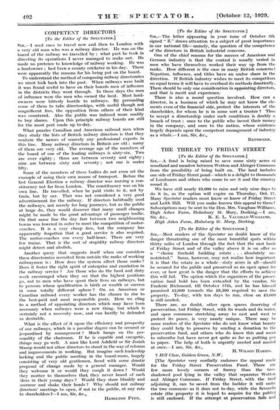COMPETENT DIRECTORS [To the Editor of the SPECTATOR.] SIR,—I used
once to travel now and then -to London . with a very old man who was a railway director. He was-on the board of the railway we travelled by ; what part he took in directing its operations I never managed to make out. He Made no pretence to knowledge of railway working. He was a landowner ; had been a county cricketer in his day. Those were apparently the reasons for his being put on the board.
To understand the method of composing railway directorates we must loOk back into the past. When railways were built it was found useful to have on their boards men of influence in the districts they went through. In those days the men of influence were the men who owned the land. Most land- owners were bitterly hostile to railways. By persuading some of them to take directorships, with useful though not magnificent fees, the opposition from others of their kind was countered. Also the public was induced more readily to buy shares. Upon this principle railway boards are still for the most part made up to-day.
What puzzles Canadian and American railroad men when they study the lists of British railway directors is that they contain the names of scarcely any professional experts in this line. Many railway directors in Britain are old ; many of them are very old. The average age of the members-of the board of one of the leading railWays is sixty-six. Two are over eighty ; three are between seventy and eighty ; nine are between sixty and seventy ; not one is under fifty.
Some of the members of these bodies do not even set the example of using their own means of transport. Before the last General Election a railway director was nursing a con- stituency not far from London. The constituency was on his own line. He travelled, when he paid visits to it, not by train, but by car. That was not considered a very good advertisement for the railway. If directors habitually used the railways, not merely for long journeys, but as the public at large do, they would discover that many small changes might be made to the great advantage of passenger traffic. On that same line the day fare between two neighbouring towns was lowered in order to meet the competition of motor- coaches. It is a very cheap fare, but the company has apparently forgotten that a good service is also required. The motor-coaches run every half-hour. There are very few trains. That is the sort of stupidity railway directors might detect and abolish.
Another query that suggests itself when one considers these directorates recruited from outside the ranks of working railwaymen is : How does the system affect those ranks ? Does it foster the right spirit of enterprise and emulation in the railway service ? Are those who do the hard and dirty work encouraged when they see that the highest positions go, not to men who have spent their lives on railways, but to persons whose qualification is birth or wealth or success in some totally different sphere ? On an American or Canadian railroad every worker has the chance to rise to the best-paid and most responsible posts. Here we cling to a method of appointing directors which may have been necessary when railways were a new thing, but which is certainly not a necessity now, and can hardly be defended as desirable.
What is the effect of it upon the efficiency and prosperity of our railways, which in a peculiar degree can be secured or jeopardized by management ? Much hangs on the per- sonality of the chairman. If he is capable and energetic, things may go well. A man like Lord Ashfield or Sir Josiah Stamp would not allow directors to stand in the way of reforms and improvements in working. But imagine such leadership lacking and the public meeting in the board-room, largely consisting of very old gentlemen, faced with some drastic proposal of change made by a general manager. Would they welcome it or would they cough it down ? Would they mutter to themselves thatl they never heard of such ideas in their young days ? Would they stare blankly and murmur and shake their heads ? Why should not railway directors' meetings be open, if not to the public, at any rate to shareholders ?—I am, Sir, &c.,
HAMILTON FYFE.








































 Previous page
Previous page